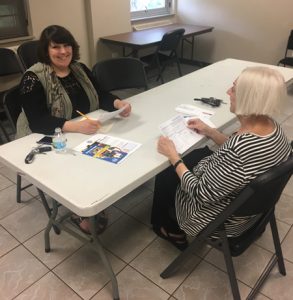
Aimee Gendusa-English (left), CUB’s lead service liaison, at a past utility-bill clinic held by the watchdog.
Illinois has received more than $41 million in extra assistance to help low-income consumers pay their electric and gas bills during the pandemic, thanks to the federal stimulus package that passed earlier this spring.
The $2 trillion Coronavirus Aid, Relief, and Economic Security (CARES) Act is a wide-ranging package designed to give families and small businesses relief from the economic crisis sparked by the COVID-19 pandemic. It passed Congress on March 27.
Aimee Gendusa-English, CUB’s lead service liaison, keeps regular contact with the energy-assistance agencies across Illinois. This week, she informed the CUB staff that on May 8, the U.S. Department of Health and Human Services (HHS) released $900 million in supplemental funding for the Low-Income Home Energy Assistance Program (LIHEAP). Illinois’ share of that is $41,841,335 for LIHEAP (pronounced LIE-HEEP).
LIHEAP helps eligible low-income households pay for their gas and electric utility service, but CUB has argued for years that the program is underfunded. Aimee explained that Illinois Department of Commerce & Economic Opportunity will use the funds to extend the existing LIHEAP program longer so more low-income families can apply. Grant amounts and income eligibility remain the same.
“This is good news and a good first step,” Aimee said. “But so much more needs to be done. This health and economic crisis won’t end soon, and we need to make sure all utility customers–low-income families, seniors on a fixed income, middle-class households–can afford their electric and gas service and keep it running reliably.”
As an added consumer benefit, Aimee said any LIHEAP out-of-pocket payment requirements are suspended. In situations where a LIHEAP recipient is receiving extra funds for re-connection or prevention of disconnection, they are normally required to make a “good faith effort” payment, kind of like a co-pay, she explained. But for now nobody will lose LIHEAP funding because they’re not able to pay a certain amount toward their bills. And consumers previously denied for not being able to make out-of-pocket payments since the start of this emergency will be reprocessed to receive their grants, Aimee said.
You can call 1-877-411-9276 (WARM) to see if you qualify for the LIHEAP program.

